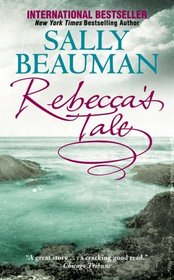Helpful Score: 6
If you loved Daphne du Maurier's "Rebecca," and didn't want it to end, then this sequel, written nearly 100 years later, is a book for you It is a real page turner, as characters familiar as well as new come forward to reveal bits and pieces about Rebecca's life and death. It was a total page-turner for me; I couldn't wait to pick it up again. Whether or not you feel the ending is satisfactory or enigmatic will be an individual choice. I've moved on to another du Maurier novel, "Jamaica inn," and can say the author of "Rebecca's Tale," Sally Beauman is good, but she is no Daphne du Maurier.
Helpful Score: 4
Published more than 60 years ago, Daphne du Maurier's Rebecca still captivates, at least partly because of its insistent ambiguity: we never learn definitively whether Maxim de Winter murdered his stunning first wife, Rebecca, or why Maxim so hastily remarried a mousy younger woman, famously unnamed. Selected by the du Maurier estate, Beauman (Destiny) has written a "companion" to Rebecca that preserves, and even deepens, the earlier novel's crafty evasions. Set in 1951, two decades after Rebecca's death was ruled a suicide, Beauman's story opens with the same (now famous) sentence as the earlier book: "Last night I dreamt I went to Manderley again." Elderly, ailing Colonel Arthur Julyan was magistrate in the district when the legendary de Winter mansion mysteriously burned to the ground. Julyan's last days are disturbed by the intrusive visits of Terence Gray, a Scottish academic who claims to be writing a book about Rebecca's death. Then both Julyan's sharp daughter Ellie and Gray, who has secrets of his own, become rattled when Rebecca's personal effects begin arriving at the Julyan home. One of the anonymously sent packages contains Rebecca's journal, written just before her death a possible Rosetta stone. Beauman expertly tells Rebecca's tale from four different perspectives Julyan's, Gray's, Ellie's and, most vividly, Rebecca's without settling which version is nearest the truth. Though a composite Rebecca emerges depressive, possibly schizophrenic, promiscuous, fearless and almost certainly "dangerous" Beauman merely hints at a biological cause, raising titillating, though fully plausible, possibilities. This lushly imagined sequel, which cleverly reproduces the cadences of du Maurier's prose, resurrects Manderley without sweeping away all the artful old cobwebs. Readers should pounce.
Helpful Score: 3
"Sequel" to Daphne du Maurier's _Rebecca_, which pretends to continue the tale 20 years after the death of the first Mrs. de Winter.
It's no _Rebecca_, but Sally Beauman had a fun idea for a book.
A breezy read.
It's no _Rebecca_, but Sally Beauman had a fun idea for a book.
A breezy read.
Helpful Score: 2
A mystery set around the death of Rebecca, the beautiful and mysterious first wife of Maxim De Winter. Well done characterizations and an excellent sense of place.
Helpful Score: 2
This book should be read as the final installment of a trilogy.
"Rebecca" is a wonderful story which leaves many questions unaswered. Susan Hill's "Mrs. DeWinter" answers many of those questions and finishes the story of Maxim and his 2nd wife.
"Rebecca's Tale" lets us in on some, but certainly not all, of her history and gives insight into who she was.
Something about it wasn't quite right but overall I enjoyed the read and now feel that I have the complete story.
This is the 3rd book. Mrs De Winter, the 2nd to Daphne du Maurier's Rebecca
http://www.dumaurier.org/reviews-rebecca.html
"Rebecca" is a wonderful story which leaves many questions unaswered. Susan Hill's "Mrs. DeWinter" answers many of those questions and finishes the story of Maxim and his 2nd wife.
"Rebecca's Tale" lets us in on some, but certainly not all, of her history and gives insight into who she was.
Something about it wasn't quite right but overall I enjoyed the read and now feel that I have the complete story.
This is the 3rd book. Mrs De Winter, the 2nd to Daphne du Maurier's Rebecca
http://www.dumaurier.org/reviews-rebecca.html




